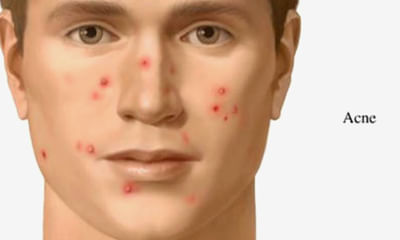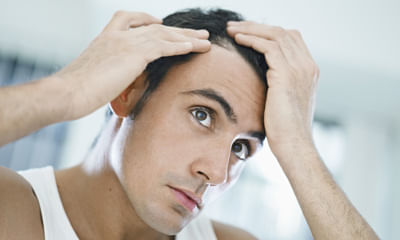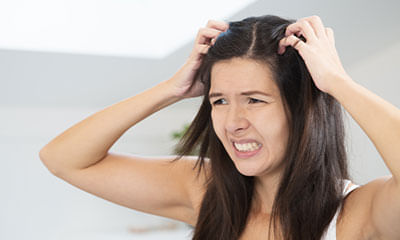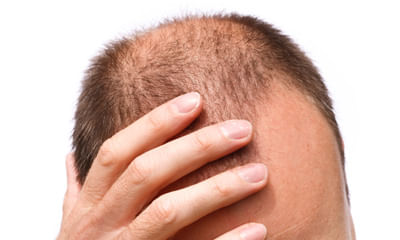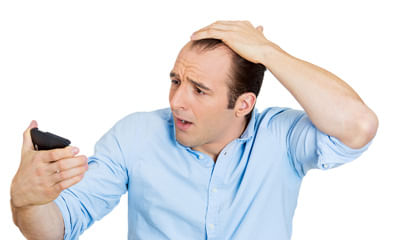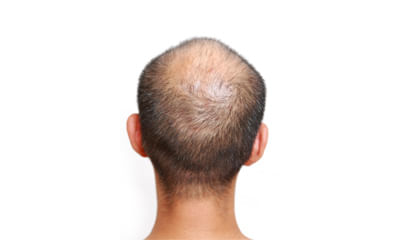Does Hair Grow Back After Seborrheic Dermatitis
I am having pus filled acne on the scalp. I have used other dye for hair after which these started, I have even shaved h ...
Ask Free Question
It may be seborrheic dermatitis or contact dermatitis to hair dye .need to consult for proper management. Once follicle destroyed only come through hair transplantation. Your feedback important satisfy or not.
Can dirt cause a severe hair fall ?like I trim my hair to zero 1 month back and still I lose so much of hair .i also had ...
Ask Free Question
No. You are suffering from seborrheic dermatitis Causing dandruff, dirt. Medicine available for good improvement. As the treatment varies depending on the severity. Send photos of the affected area, by direct online consultation for accurate diagnosis and treatment.
I want to know any safe way to treat dandruff or seborrheic dermatitis of eyebrows as I have lost many brows n lashes du ...
Ask Free Question
Use dahi before washing hairs. Use shampoo twice in a week. Do oiling and wash hairs with light hand circulation on scalp. Avoid fatty and spicy food. Apply crisophanic acid 30 daily on scalp. FOR FURTHER DETAILS CONTACT.
Sir, I am 22 and my hair starting to loose. It went from thick to thin all of a sudden. Are there any remedies to grow b ...
Ask Free Question
Warm up castor oil. Apply it on clean scalp. Massage it well. ... Wrap your hair in a warm moist towel and keep it on for 20 minutes. As the oil is very sticky, you can add a little lemon juice to it that will make it a bit smooth and also eradicate dandruff problems on your scalp.
I have a serious hair fall and thinking problem. Dandruff is so much in my hair. Tell me some medicine to cure my hair f ...
Ask Free Question
Do not use shampoo and apply coconut oil and only dry excess oil if any without soap or shampoo Hair fall is a very common phenomenon that plagues millions of people around the globe. Most of you take supplements of vitamin on a regular basis as it aids the build-up of new hair and skin cells. Read on to find out how exactly do the various vitamins help your hair: 1.Vitamin A: This vitamin controls the production of retinoic acid in your hair follicle. It is not only helpful for skin care but stimulates hair growth. It is immensely fruitful in moisturizing your hair and keeping it healthy. Vitamin A is usually found in sweet potatoes, carrots, tuna, lettuce, mango, sweet red peppers, green leafy vegetables and spinach. 2.Vitamin B: Variants of this, such as B12, aid in hair growth by managing stress. Vitamin B is found in fruits such as oranges and papayas, and beans. 3.Vitamin C: This vitamin helps you absorb iron from the food you eat which is an absolute essential for hair growth. It also boosts the synthesis of collagen that is required to repair the damage and sustain the structure of your hair. Fruits such as papayas, guavas, lemons, sweet lime, orange, kiwi, vegetables such as broccoli, yellow bell peppers and leafy vegetables are replete with Vitamin C. 4.Vitamin D: This vitamin rejuvenates the hair cells in order to form new shafts of hair. Vitamin D is found in dairy products, mushrooms, soy milk, tofu, and cheese. Vitamin D is also naturally made by your body when you expose your skin to the sun, and is called the sun-shine vitamin. 5.Vitamin E: This aids in stimulating capillaries and enhancing blood circulation on the scalp. This additionally contributes to hair growth due to its high anti-inflammatory properties and antioxidant content. Certain foods loaded with Vitamin E are pumpkin, broccoli, olive oil, sunflower seeds, almonds, avocado, tofu and spinach. 6.Vitamin B5: It is also known as Panthenol, is a vital ingredient that is used in medicines to regulate hair fall. Foods enriched with Vitamin B5 are sweet potatoes, sunflower seeds, avocados, cheese and mushrooms. Other Ways to Help Hair- We have gone over the vitamins that may be important for the health of your hair. But lifestyle changes can help just as much. Try: 1.Cutting back on gels, blow-drying, and brushing hair when wet 2.Lowering your stress by exercising at least 30 minutes a day 3.Drinking enough water, 6-8 glasses a day Being mindful of the foods and drinks you consume, the products you use, and the way you manage stress, can all help improve the well-being of your hair. If you wish to discuss about any specific problem, you can ask Home Remedies For Dandruff Cure: 1. Coconut Oil & Lemon Massage Coconut oil nourishes your hair, while lemon juice helps to treat dandruff at home without using harmful chemicals. Given below is the easiest dandruff home remedy: Step 1: Heat 2 tablespoons of coconut oil and mix it with equal amounts of lemon juice. Step 2: Massage your scalp gently with the mixture. Step 3: Leave it on for 20 minutes before rinsing if off without shampoo. 2. Fenugreek Pack as a Dandruff Remedy This home remedy for dandruff uses fenugreek seeds. Follow the instructions below to use fenugreek pack to cure dandruff: Step 1: Soak some fenugreek or methi seeds in water overnight. Step 2: Drain the leftover water and mash the softened seeds into a paste. Step 3: Let the paste sit for about an hour. Step 4: Rinse it off without shampoo. 3. Curd Treating dandruff at home with curd is a little messy but very effective. Method for using curd as a home remedy for dandruff is given below: Step 1: Apply some curd to your hair and scalp. Step 2: Let it sit tight for about an hour. Step 3: Rinse it off without shampoo 4. Baking Soda is a great home remedy for dandruff Dandruff treatment can be carried out at home with baking soda as well. The remedy to use baking soda for dandruff treatment is given below: Step 1: Wet your hair slightly. Step 2: Keeping your hair wet, rub a spoonful of baking soda on your scalp. Step 3: Leave it on for 60-90 seconds prior to washing it off. 5. Tea Tree Oil Tea tree oil is another way to cure dandruff at home. Follow the instructions given below to treat dandruff at home easily: Step 1: Pour a few drops of tea tree oil on your scalp and spread it evenly. Step 2: Let it soak for 5 minutes. Step 3: Wash it off without shampoo.
I was suffering from fungus and dandruff on my scalp. Due to which there was hair fall. A dermatologist gave me some pil ...
Ask Free Question
Dandruff may be due to various causes other than fungal infection like Vitamin and mineral deficiency, seborrheic dermatitis, psoriasis, Hormones imbalances and many other causes. For correct diagnosis and treatment, send me more information (including pictures of affected areas) about your health and illness. Avoid all sorts of soaps, shampoo and detergent chemicals, Use nothing too hot in winter and use nothing too chilled in summer. Avoid Junk food, spicy pungent highly seasoned food. Have a head wash with Amla & Reetha Water {put some whole dried Amla (Indian gooseberry) & whole dried Reetha (the soap nut) in bowl of lukewarm water in evening and use its liquid to wash head in morning} If you have good faith in Homeopathy you can apply homeopathic medicines in the scalp. Internally you can also take - Cantharis 30 & Natrum M 30 Under supervision of qualified homeopathic consultant only.
I am 25 years male. I've too much dandruff it always remains there in my head for 7 to 8 months in a year, as hair grows ...
Ask Free Question
Avoid all sorts of soaps shampoo and detergent chemicals, Use nothing too hot in winter and use nothing too chilled in summer. Avoid Junk food, spicy pungent highly seasoned food. Dandruff may be due to various causes like Vitamin and mineral deficiency, fungal infections, seborrheic dermatitis, psoriasis, Hormones imbalances and many other causes. For correct diagnosis and treatment, send me more information about your health. Have a head wash with Amla & Reetha Water {put some whole dried Amla (Indian gooseberry) & whole dried Reetha (the soap nut) in bowl of lukewarm water in evening and use its liquid to wash head in morning} If you have good faith in Homeopathy you can apply: Berberis Aquifolium Q 10% & Cochleria Q 20% in pure water for oily scalp. Internally you can also take - Can notharis 30 & Natrum M 30 (each thrice daily) Under supervision of qualified homeopathic consultant only Also take some vitamin and mineral supplements with Homeopathic medicines.
I have been experiencing a lot of hair fall from the past six month .that was because of seborrheic dermatitis .i went t ...
Ask Free Question
Likely. Continue treatment for a longer period do 1.Sulphur may help you grow new hair take Garlic. 2.Keep scalp clean 3.Do dry massage of scalp for 10 mts 4.Apply coconut oil to the scalp at night and wash in the morning 5.Treat dandruff with ketoconazole shampoo twice a week 6.If no dandruff use vatika shampoo 7.Take good healthy nutritious diet including fruits and vegetables- Eggs, Cheese ,Cauliflower ,Whole Grain atta, berries, mushrooms (good source of biotin vit B7) 8.Curry leaves extract (boiling in water and taking that water) 9.Do not apply any gel/lotion /any other chemical on scalp 10.Get thyroid t3 t4 tsh tested.
I'm suffering from heavy dandruff Please help to heal that problem I'm used so many products and I'm consulted many doct ...
Ask Free Question
Causes of dandruff the following are factors that may contribute to dandruff: 1) not enough hair brushing you should apply oil on scalp regularly and wash hair with the help of anti-dandruff shampoo for proper management. People who do not comb or brush their hair regularly have a slightly higher risk of having dandruff - this is because they are not aiding the shedding of skin that combing or brushing provides. 2) yeast people who are sensitive to yeast have a slightly higher risk of having dandruff, so it is logical to assume that yeast may play a part. Yeast-sensitive people who get dandruff often find that it gets better during the warmer months and worse during the winter. Uva light from the sun counteracts the yeast. Some say, that during winter the skin is drier because of cold air and overheated rooms (exposure to extreme temperatures), making dandruff more likely. So, it is sometimes not that easy to know whether it is yeast or just dry skin. Dandruff people with dry skin tend to get dandruff more often. Winter cold air, combined with overheated rooms is a common cause of itchy, flaking skin. 3) dry skin people with dry skin tend to get dandruff more often. Winter cold air, combined with overheated rooms is a common cause of itchy, flaking skin. People with dandruff caused by dry skin tend to have small flakes of dandruff; the flakes are not oily. 4) seborrheic dermatitis (irritated, oily skin) people with seborrheic dermatitis are very prone to dandruff. Seborrheic dermatitis affects many areas of the skin, including the backs of the ears, the breastbone, eyebrows, and the sides of the nose, not just the scalp. The patient will have red, greasy skin covered with flaky white or yellow scales. 5) not enough shampooing some people say that if you don't shampoo enough there can be a buildup of oil and dead skin cells, causing dandruff. However, many experts doubt this is true. 6) certain skin conditions people with psoriasis, eczema and some other skin disorders tend to get dandruff much more frequently than other people. 7) some illnesses adults with parkinson's disease and some other neurological illnesses are more prone to having dandruff and seborrheic dermatitis. Patients recovering from heart attacks and strokes and some people with weak immune systems may have dandruff more often than other people. 8) reaction to hair or skin care products some people react to some hair care products with a red, itchy, scaling scalp. Many experts say that shampooing too often may cause dandruff as it can irritate the scalp. 9) malassezia malassezia is a fungus that lives on everybody's scalp. Generally, it will cause no problems at all. However, it can grow out of control. It feeds on the oils our hair follicles secrete. When this happens, the scalp can become irritated and produce extra skin cells. These extra skin cells die and falloff; they mix with the oil from the hair and scalp, and turn into what we see as dandruff. 10) diet some experts say that people who do not consume enough foods that contain zinc, b vitamins, and some types of fats are more prone to dandruff. 11) mental stress experts believe there may be a link between stress and many skin problems.
What is the main reason of hairfall? And what is the solution for it? And what is the reason behind extra dandruff? And ...
Ask Free Question
Hi. It's normal to lose up to 100 hair per day, and in most people, those hairs grow back. But many men -- and some women -- lose hair as they grow older. You can also lose your hair if you have certain diseases, such as thyroid problems, diabetes, or lupus. If you take certain medicines or have chemotherapy for cancer, you may also lose your hair. Other causes are stress, a low protein diet, a family history, use of bore water, or nutritional deficiencies. Need to rule out any causative factor or underlying medical condition. Management: take diet rich in protein like non-veg, eggs (it's loaded with essential nutrients such as proteins, vitamin b12, iron, zinc and omega 6 fatty acids in large amounts and biotin), different pulses & legumes, sprouts, nuts (sp. Walnuts and almonds); iron-rich food like green vegetables, dates, carrots, prunes, green peas; also oats, shrimp, take flaxseeds, sunflower seeds, sesame seeds, green tea, soyabean, fruits, salads, etc. Take low-fat dairy products (they also contain whey and casein, two high-quality protein sources) take proper 6-9 hrs of sound sleep. Give up the habit of smoking and excessive alcohol intake. Avoid junk food and any kind of beverages (tea, coffee, aerated drinks, cold drinks, etc.) avoid canned/ tinned food or food that contains preservatives (eat fresh ones). Avoid use of hard water to wash the head rather use boiled water for head wash. Avoid use of harsh hair colour, hair treatment like rebonding, straightening, perming, etc. Avoid vigorous exercises or any supplements provided by the gym! cover your head with scarf or cap while stepping outside. Use rose wood/ any wooden hair comb to brush your hair. Regularly massage head and hair with coconut oil, almond oil (depending upon your scalp type) 1 to 3 times a week. Regular exercising is also one of the important point, but should be done under some good, qualified yoga teacher or instructor for proper guidance; it also releases the stress/ tension in the mind and the body and keeps you fit and young! medication: take homoeopathic medicines - schwabe's wiesbaden 200 & alfalfa tonic twice a day for 3 months. Use schwabe's arnica shampoo and hair growth oil regularly as per the condition of your scalp (minimum 3 times a week). After shampooing, use bakson's arnica hair conditioner as well after every head wash. Beside this, you can take one tablet of multivitamin folli hair once daily for 3 months. Get back to me for further advise. For dandruff: the exact cause of seborrheic dermatitis is not known, but it seems to be a combination of things, including: stress your genes a yeast that normally lives on skin certain medical conditions and medicines cold, dry weather newborns and adults aged 30-60 are more likely to get seborrheic dermatitis. It's more common in men than women and in people with oily skin. These medical conditions can also raise your risk: acne aids alcoholism depression eating disorders epilepsy heart attack or stroke recovery parkinson's disease psoriasis rosacea seborrheic dermatitis is also called dandruff, seborrheic eczema and seborrheic psoriasis. It isn't contagious, and it's not a sign of poor personal hygiene. Few self-care tips can help you control and manage seborrheic dermatitis (dandruff): soften and remove scales from your hair. Apply mineral oil or olive oil to your scalp. Leave it in for an hour or so. Then comb or brush your hair and wash it. Wash your skin regularly. Rinse the soap completely off your body and scalp. Avoid harsh soaps and use a moisturizer. Avoid products that contain alcohol. These can cause the disease to flare up. Wear smooth-textured cotton clothing. This helps keep air circulating around your skin and reduces irritation. If you have a beard or mustache, consider shaving it off. Seborrheic dermatitis can be worse under mustaches and beards. If this is the case for you, shaving might ease your symptoms. Avoid scratching. Scratching can increase irritation and your risk of infection. Gently clean your eyelids. If your eyelids show signs of redness or scaling, wash them each night with baby shampoo and wipe away scales with a cotton swab. Warm or hot compresses also may help. Use lukewarm water for head wash. Medication: take homoeopathic medicines - schwabe's badiaga 200 & alfalfa tonic twice a day for 1 month and revert. Use schwabe's anti-dandruff shampoo and anti-dandruff oil regularly as per the condition of your scalp (minimum 3 times a week). After shampooing, use bakson's arnica hair conditioner as well after every head wash. Apart from this, you can take one tablet of multivitamin folli hair once daily for 1 month.

